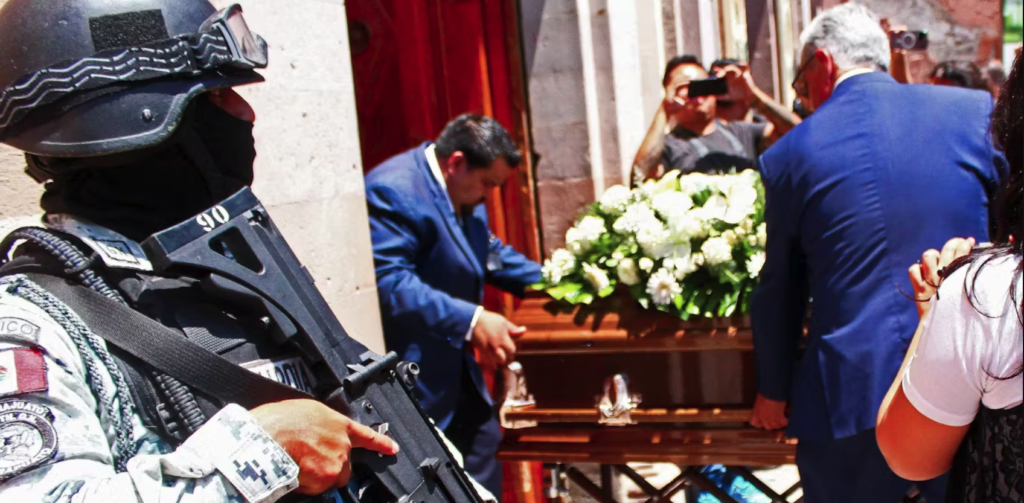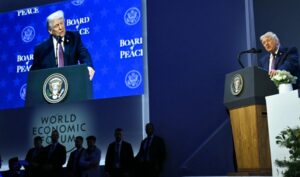
Published 05/31/2024 17:44 | Edited 06/01/2024 09:29
Mexico’s presidential candidates formally ended their campaigns on Wednesday, with most polls showing ruling party candidate Claudia Sheinbaum on track to become the country’s first female president after Sunday’s national vote. However, at the local level, many campaigns ended much earlier due to political violence.
Later on Wednesday, after the large rallies and the end of the presidential campaigns, the violence of the current campaign season was punctuated by the point-blank murder of a local mayoral candidate belonging to the same coalition that supports Gálvez in the south from the state of Guerrero. The shooting death of a mayoral candidate at a campaign event was captured on video and marks the 36th murder of a candidate during the 2024 cycle, equaling the previous record for murders in midterm elections three years ago, according to data from the consultancy Integralia security system. The victim was one of 560 candidates and election officials who were assigned government-supplied security guards due to persistent threats.
Organized crime stepped forward and has already won in some provinces, by murdering those candidates who did not represent them. The course of the day and the immediate post-election events will suffer from impediments in some regions of the country due to drug trafficking violence, as has unfortunately already occurred. The fragmentation of the country’s gangs in recent years, with the cartels dividing into separate branches, worsens the dispute over territories in the middle of the election period.
Between 2018 and March 2024, there were 1,709 targeted attacks, assassinations, assassinations and threats against people working in politics or government, or against government and party facilities. Most of these attacks occurred before the elections; This year will not be different.
Latin America’s second-largest economy will hold the biggest elections in its history, with more than 20,000 local, state and federal government positions up for grabs and nearly 100 million Mexicans eligible to vote. In the previous presidential race in 2018, 63% of eligible voters voted, and experts point to unpredictable turnout as a key variable in this election.
In addition to the presidency, voters will choose legislators for both chambers of Congress, a new mayor of Mexico City, eight state governors, as well as dozens of local officials.
Political violence in Mexico
The election season in Mexico was marked by political violence. Between 2018 and March 2024, there were 1,709 targeted attacks, assassinations and threats against people working in politics or government, or against government and party facilities. Most of these attacks occurred before the elections; This year will not be different.
If current statistics are anything to go by, the 2024 election season in Mexico will likely be the deadliest on record in the country. In the first two months of the year alone, 33 people involved in politics were murdered, a flow of deaths that slowed with drastic security measures, with escorts for targeted candidates.
Violence against Mexican politicians is common, but the country’s powerful organized gangs intensify political violence during election season as they seek to ensure compliance with new candidates and secure business opportunities.
Mexico’s most famous political assassination occurred 30 years ago, in the run-up to the 1994 general elections, when Luis Donaldo Colosio, a charismatic presidential candidate, was shot and killed during a campaign rally in the border city of Tijuana. Critics have long rejected the official conclusion that Aburto, a factory worker, acted alone, arguing that drug cartel leaders and political interests were behind the murder.
It’s not just high-ranking politicians who are at risk. Mexican politicians, at all levels, are repeatedly targets of violence linked to organized crime, especially those who hold or seek regional positions. The wave of violence ahead of the 2024 elections has already forced dozens of candidates in several states to abandon their campaigns out of fear for their lives.
Security for democracy
In a region marked by coups, counter-coups and dictatorships, Mexico has always been a shining example of a nation that adheres to rigorous democratic credentials. This record is now at risk of being tarnished by the violent intervention of criminal groups in the country’s political processes.
The ongoing violence against politicians and political candidates in Mexico reflects the struggle for territorial consolidation and lucrative business opportunities among various organized criminal groups. Simply put, the fear of deserving the wrath of criminal groups often prevents well-intentioned politicians from running for public office, seriously affecting democracy in the country.
Virtually every governor in the country is leading the operations implemented to ensure a safe and peaceful election day. The emphasis was redoubled in states where acts of political violence were recently recorded. This is the case of Guerrero, where governor Evelyn Salgado declared in permanent session the Coordination Table for the Construction of Peace from which the development of next Sunday’s elections will be monitored. Currently, emphasis has been placed on ensuring the safe transfer of election material. 28,800 members of Sedena, the Navy, the National Guard and the state police are already working on this.
In light of recent events in the State of Mexico, Governor Delfina Gómez reinforced the protection mechanisms for candidates for elected office in the state. Leading the task is the Secretary of Security, Andrés Andrade, who reported that the efficient work of the National Guard together with the state and municipal police allowed that until the end of the campaigns, no serious incidents were recorded in the 125 municipalities that make up Edomex (State from Mexico).
Closing of campaigns and candidates
Sheinbaum, former mayor of Mexico City, ended her campaign in the capital’s busy Zócalo square on Wednesday afternoon alongside her party’s candidate for mayor of Mexico City, Clara Brugada. Brugada is competing to maintain the left’s grip on power in the sprawling metropolis, which the left has controlled since voters began electing its mayor in the late 1990s.
Sheinbaum, a 61-year-old scientist, has vowed to build on the legacy of current President Andrés Manuel López Obrador, her close ally who in 2000 chose her to be his environment chief when he was mayor of the capital. “The foundations have been laid,” Sheinbaum said, praising López Obrador for his efforts to reduce poverty and violence. The leader spoke of adjusting policy around key issues including energy, security and corruption, but avoided highlighting differences with López Obrador. Although Sheinbaum promises to be the one to govern if she wins, some say her political mentor would have great influence.
Opposition challenges and promises
Xóchitl Gálvez, standard-bearer of a left-right opposition coalition, ended his campaign in Monterrey, a city in Mexico’s northern industrial heartland, days after he led a large rally in the capital. The 61-year-old former senator and businesswoman promised to improve and expand social programs, as well as combat corruption and widespread violence triggered by organized crime, in a country where homicides reached a record 185,000 during López Obrador’s term. “No more lies! They say that Mexico is better than ever, and that is not true… Mexico wants peace and tranquility,” said Gálvez at his event in the city of Los Reyes Acaquilpan, in the State of Mexico.
Gálvez is 17 points behind Sheinbaum in the Oraculus poll, an average compiled by local polling firm Buendía & Márquez.
Jorge Álvarez Maynez, a 38-year-old former congressman who is well behind in third place, will end his campaign with a concert in Mexico City.
Whoever wins will face challenges on multiple fronts, including rampant impunity amid high murder and kidnapping rates, weak economic growth and questions about future energy policy.
Traditional right withers
Some things are safe to say about this election. To begin with, the first female president in a country known for extreme and violent machismo will emerge, almost 69 years later (July 3, 1955) after Mexican women won the right to vote and after a long struggle for gender equality that will reach its climax on Sunday. Femicide rates in Mexico remain shockingly high, with 10 women and girls killed every day, not to mention rapes and sexual harassment. This is all despite women already representing half of Mexico’s Congress and holding high-level political and judicial positions, which makes the challenge of the Presidency of the Republic even greater.
If the difference between the winner and the runner-up were small, it could give rise to suspicions of fraud, protests, street protests and uncertainty like that experienced in 2006 during the Sunday night of the elections, and in the subsequent months. This scenario disappears when we see the wide advantage that the poll average gives to Claudia Sheinbaum, government candidate, over Xóchitl Gálvez, a candidate from the conservative tradition.
Voting intention polls are, despite their possible inaccuracies, the most objective tools for documenting the state and meaning of public opinion. All give a two-digit advantage to the candidate Morena, although the GEA-ISA one caught the attention, reducing the disadvantage of the PRIAN candidate (PRI and PAN) to eight points.
As for the formation of Congress, according to research, Morena and her allies will not reach the qualified majority that would allow them to reform the Constitution alone, although they will most likely achieve an absolute majority with half plus one of the legislative seats.
The nominal voter list was finally made up of 98.32 million citizens. Abstentionism, according to the average of the last three presidential elections, could be 38.81%. It is estimated, therefore, that 60.65 million voters will be voting on Sunday.
Of this total, the polls give Morena 26.69 million voters (44%), PAN 12.73 million (21%), MC 6.06 million (10%), PRI another 6.06 million (10%), Greens 3.63 million (6%), PT 2.42 million (4%) and PRD 1.21 million (2%).
The latter would barely have the minimum necessary to maintain registration as a party. But for the PRI (which will no longer be able to celebrate its centenary), the panorama is no less sinister: the same number of votes as the MC, reduced access to multi-party delegations and entry into the fields of merely drawer parties. In this way, conservative parties that governed Mexico with an iron fist for seven decades are despised by the majority of the population and could become politically irrelevant after this election.
The prediction of a now rejected PRI party, which warned that the once great party would be taken to the grave with current party president Alejandro Moreno Cárdenas, Alito, would be coming true. The resignation of the former PRI candidate for the government of the State of Mexico, Alejandra del Moral, was another nail in her coffin. With it, what remains of the powerful Atlacomulco Group, made up of influential politicians from the State of Mexico, the PRI’s main electoral stronghold, is falling apart.
Add to this the pile of enemies from his own party that “Alito” left behind, due to his controversial decisions and leadership, then it is not unreasonable to think that they are already preparing a kind of “night of the long knives”, a purge politics, where disgruntled party members could be preparing to take drastic action against Moreno Cárdenas, possibly removing him from leadership or marginalizing him, in hopes of saving the party from complete collapse.
Source: vermelho.org.br

